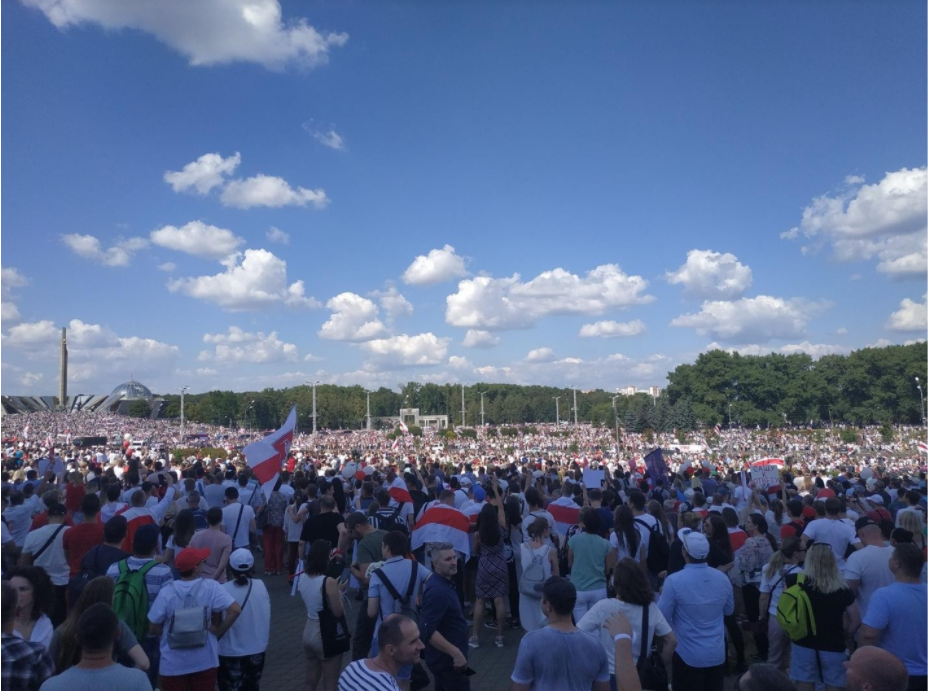Analyzing the systematic silencing and violence in Belarus surrounding the 2020 Belarusian Presidential Election

In August 2020, Belarus held their quinquennial presidential election. Despite apparent widespread disapproval, the 26-year incumbent Alexander Lukashenko, nicknamed “Europe’s Last Dictator,” won re-election in a landslide victory.
According to an independent online poll conducted by the Institute of Sociology of the National Academy of Sciences of Belarus and the Belarusian Institute of Strategic Studies, Lukashenko’s approval rating stood at 3.8 percent, contrasting a 24 percent approval rating by official polls. These results were in stark contrast to the election exit polls, which showed Lukashenko winning with over 80 percent of the vote. When these results were announced, many Belarusians believed the election was rigged and protests immediately erupted.
Ever since, the nation has been in a state of unrest. This November 15 weekend marked the 14th straight week of protests, whereby tens of thousands of Belarusians gathered in Minsk. Belarusain security forces have reacted violently to the protests and have been accused of torturing protesters. Furthermore, Lukashenko has issued threats including, “if someone touches a serviceman… he must leave at least without hands.”
The legitimacy of Belarus’ election cannot be established due, in part, to constraints on the media. Unconstitutional legislation allows state regulation of the media and criminalizes criticism of the government, effectively stripping the press of any ability to investigate the validity of the election. The Belarusian Constitution of 1994 protects free expression, and protects against censorship and the monopolization of the mass media by the State, as articulated under Article 33:
“Everyone is guaranteed freedom of thoughts and beliefs and their free expression. No one shall be forced to express one’s beliefs or to deny them. No monopolization of the mass media by the State, public associations or individual citizens and no censorship shall be permitted.”
However, recent legislation has encroached on these constitutional rights. In 2008, the Belarusian House of Representatives enacted a new media law, formally Law No. 427-Z of July 17, 2008. Under article 1(1) of the 2008 media law, mass media platforms need government accreditation in order to “cover actions organized by state bodies, political parties, other public associations, other legal persons as well as other events taking place in the territory of and outside the Republic of Belarus.” Article 38 (1.3) provides the government the power to refuse accreditation if mass media outlets disseminate “information aimed at propaganda of war, violence, cruelty, extremist activities or containing appeals for such activities, as well as other information dissemination of which is prohibited by the present law, other acts of legislation of the Republic of Belarus.” Moreover, the Belarusian government has the power to terminate a mass medium’s accreditation under Article 51. Collectively, this law’s provisions provide the government with the power to precisely select who may contribute to the Belarusian media landscape.
Even if a media outlet is able to secure accreditation, criticism of government officials can amount to defamation — a criminal offence. Articles 367, 368, and 369 of the Belarusian Criminal Code criminalize defamation of the president, insult of the president, and insult of a public official. Past charges have been made under these aforementioned sections of the Criminal Code for accusing the government of corruption and criticizing Belarus to international organizations/states. Therefore, if journalists have contrasting views to those of the president, they must choose between engaging in self-censorship or risk being charged for thoughtcrime.
The 2008 media law is not the first to contradict the country’s Constitution. The mechanics of this legal maneuver are described in an article from the East European Constitutional Review:
“In order to circumvent the Constitution and various laws adopted during the first years of independence, Belarusian legal scholars introduced a novel twist into jurisprudential theory: the distinction between “legal” and “nonlegal” laws. If a law corresponds to the public’s intentions, they reasoned, it should be deemed a “legal” law; if, on the other hand, it contradicts the public’s mood and the president’s intentions, it should be considered a “nonlegal” law and may be ignored altogether.”
The Belarusian government has used the above powers to regulate media coverage of the election. Access to websites covering the presidential election have been blocked and critical journalists have been arrested. Using these powers, the government prevents journalistic investigation into the legitimacy of the election and the state may propagate its desired narrative.
The Republic of Belarus deserves global attention. Canada, among many other countries, has been quick to support the pro-democracy movement in Belarus. Minister of Foreign Affairs, François-Philippe Champagne stated on October 15, 2020: “Canada continues to stand in solidarity with the people of Belarus as they struggle to restore human rights and achieve democracy in their country.” More importantly, global focus must turn to the rights-violating repression of freedom of speech and government control of the media. This small country in Eastern Europe has the opportunity to emerge as Europe’s newest democracy and its government should not be allowed to forcibly maintain its habitual state of authoritarianism. If the people of Belarus are muted, the rest of the world must speak up on their behalf.
A version of this article appears on Rights Review’s website here.





